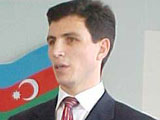|
|
TODAY.AZ / Society
Azerbaijani MP: Perpetrators of "Bloody January" has already received punishment
19 January 2010 [19:00] - TODAY.AZ
Problems of the USSR had started since Mikhail Gorbachev came to power, Azerbaijani member of parliament Zahid Oruj said.
 Oruj said that "the events of that period have been widely covered and numerous books have been written about them. But, I think, the public will gradually learn new facts about events of the "Bloody January".
Oruj said that "the events of that period have been widely covered and numerous books have been written about them. But, I think, the public will gradually learn new facts about events of the "Bloody January".“It should be noted that the problems of the Soviet Union began since Mikhail Gorbachev came to power. It is symbolic fact that although the U.S. was seeking collapse of the USSR through the arms race and economic war, the trouble for the Soviets came from inside,” he said.
‘It marked a start for the USSR collapse which was due to several reasons. First, the "prohibition" and the cutting of vineyards across the Soviet Union caused problems in the economy of several Soviet republics.”
“Secondly, the idea of the general public launched by Mikhail Gorbachev progressed through several media,” the MP added.
“Thirdly, autonomies had been established in some Soviet republics. These territorial units were intended to harm in any way Soviet republics who intended to leave the Soviet Union or in any way show disobedience. It happened in the case of Azerbaijan. On Feb. 19, 1989, the Nagorno-Karabakh Autonomous Republic announced that it intends to withdraw from the Azerbaijan SSR,” the MP noted.
“It was after these events that the Soviet Army entered Tbilisi (1989), Baku (1990), and Vilnius after that. Thus, the Soviet Army was Bloody Army for the people.”
“Moreover, after the events of 20 January in Baku, Azerbaijan national movement grew into a movement for independence.”
“On one hand, the victims of the January 20 is a symbol of the struggle for Azerbaijan’s independence. We will never forget their heroism. On the other hand, these events were tragedy for the Azerbaijani people,” the MP said.
“Unfortunately, at that time international community did not give an objective political and legal assessment to those events. I think that their punishment, and correct assessment of the roots of those events would have an impact on the solution of the Karabakh problem. But, on the other hand, many of the perpetrators of "Bloody January" have already received punishment. The fate has punished them,” he added.
Z. Ahmadov
URL: http://www.today.az/news/society/59763.html
 Print version
Print version
Views: 1197
Connect with us. Get latest news and updates.
See Also
- 21 June 2025 [18:25]
Azerbaijan and Albania sign tourism cooperation memorandum to boost sustainable development and cultural exchange - 21 June 2025 [18:15]
Azercell welcomes World Champions - 21 June 2025 [17:49]
Int'l Mugham Center celebrates jubilee of acclaimed musician with gala concert - 21 June 2025 [16:42]
Preliminary amendment proposed to constitution of Nakhchivan Autonomous Republic - 21 June 2025 [16:21]
American officials praise Azerbaijan’s support at border checkpoint - 21 June 2025 [16:00]
Powers of Nakhchivan Parliament Speaker to be expanded - 21 June 2025 [15:39]
Institute of Manuscripts opens exhibition as part of World of Mugham Int'l Music Festival - 21 June 2025 [15:23]
Trial testimony confirms illegal settlement of foreigners in formerly occupied Azerbaijani territories - 21 June 2025 [15:02]
Azerbaijan's tea traditions showcased at UNESCO headquarters - 21 June 2025 [12:24]
Human bone fragments found in Jabrayil’s Derzili village
Most Popular
 Markus Rittel's Fantasies as consequences of Armenian "hospitality"
Markus Rittel's Fantasies as consequences of Armenian "hospitality"
 Macron kicked out of Niger
Macron kicked out of Niger
 President Ilham Aliyev orders approval of cooperation plan with China under Belt and Road Initiative
President Ilham Aliyev orders approval of cooperation plan with China under Belt and Road Initiative
 Adobe launches 'Project Indigo', free-to-use iPhone app for SLR-style photos
Adobe launches 'Project Indigo', free-to-use iPhone app for SLR-style photos
 Azerbaijan, Georgia discuss strengthening parliamentary cooperation
Azerbaijan, Georgia discuss strengthening parliamentary cooperation
 President Ilham Aliyev approves Azerbaijan-China Agreement on International Multimodal Transportation
President Ilham Aliyev approves Azerbaijan-China Agreement on International Multimodal Transportation
 EBRD highlights Azerbaijan’s strong potential in developing low-carbon hydrogen sector
EBRD highlights Azerbaijan’s strong potential in developing low-carbon hydrogen sector
